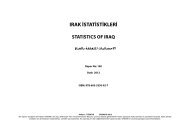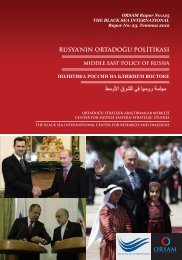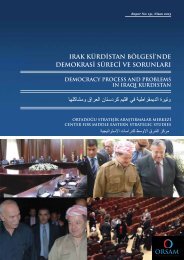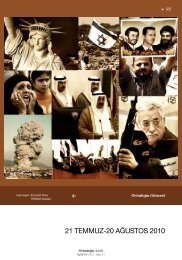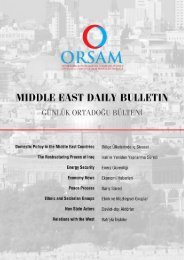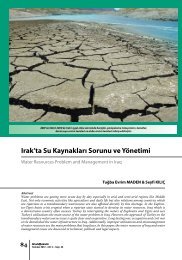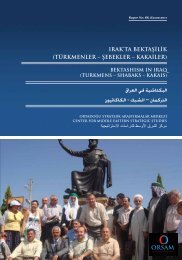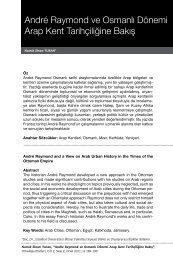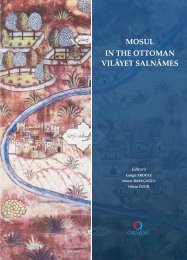turkmen in iraq and their flight - orsam
turkmen in iraq and their flight - orsam
turkmen in iraq and their flight - orsam
You also want an ePaper? Increase the reach of your titles
YUMPU automatically turns print PDFs into web optimized ePapers that Google loves.
TURKMEN IN IRAQ AND THEIR FLIGHT: A DEMOCRAPHIC QUESTION<br />
tors <strong>in</strong> persuad<strong>in</strong>g Iraqis to follow <strong>in</strong> the footsteps<br />
of <strong>their</strong> fellow citizens who have migrated<br />
to the popular dest<strong>in</strong>ations, such as Western<br />
European countries. Given the current tendencies<br />
towards stricter control of immigration <strong>in</strong><br />
Europe <strong>and</strong> similar efforts to limit <strong>and</strong> control<br />
flows of immigration by tighten<strong>in</strong>g admission<br />
regimes elsewhere, those potential Iraqi migrants<br />
will be left with very few choices. The<br />
literature reveals a variety of cl<strong>and</strong>est<strong>in</strong>e ways<br />
<strong>in</strong>clud<strong>in</strong>g visa-overstay<strong>in</strong>g, illegal entry, fraudulent<br />
asylum seek<strong>in</strong>g, <strong>and</strong> so on.<br />
Not surpris<strong>in</strong>g but important to note that over<br />
90 percent of asylum applications reported<br />
<strong>in</strong> table 4 were recorded <strong>in</strong> Europe. Also one<br />
should remember that the majority of asylum<br />
seek<strong>in</strong>g population rema<strong>in</strong>s <strong>in</strong> the country of<br />
dest<strong>in</strong>ation even if <strong>their</strong> applications are refused.<br />
Thus the Iraqi immigrant stock <strong>in</strong> <strong>in</strong>dustrialised<br />
countries is bigger than what is reported<br />
<strong>and</strong> likely to grow. Undocumented or irregular<br />
immigrants should also be considered when<br />
estimat<strong>in</strong>g the total stocks. Referr<strong>in</strong>g back to<br />
our concept of environment of human <strong>in</strong>security,<br />
those Iraqis arrived <strong>in</strong> ‘relative security’ of<br />
Europe are likely to stay longer <strong>and</strong> even settle<br />
down. This can be <strong>in</strong>terpreted as an <strong>in</strong>dicator<br />
of future migration flows.<br />
The Kirkuk Question <strong>and</strong> Human Mobility<br />
Kirkuk, the city <strong>and</strong> the region, has been a key<br />
concern for Iraqi governments <strong>and</strong> global big<br />
powers <strong>and</strong> of course for the people who live <strong>in</strong><br />
there. For the former, it is ma<strong>in</strong>ly about oil reserves<br />
while for the latter it is a key human security<br />
concern. Invasion of Iraq <strong>and</strong> the ouster of<br />
Saddam Husse<strong>in</strong> <strong>in</strong> 2003 escalated the contest<br />
over Kirkuk <strong>and</strong> made it a crucial issue <strong>in</strong> need<br />
of an urgent resolution. As Romano (2006) put<br />
it correctly, both Kurds <strong>and</strong> Turkmen like to<br />
“portray Kirkuk as <strong>their</strong> “Jerusalem,” imply<strong>in</strong>g<br />
a quasi-religious <strong>and</strong> <strong>in</strong>alienable attachment<br />
to the city”. For Turkmen, the Kurdish claims<br />
rem<strong>in</strong>d Saddam Husse<strong>in</strong>’s Arabisation policies.<br />
Turkey apparently, <strong>in</strong> l<strong>in</strong>e with her overall Iraq<br />
policy, prefers Kirkuk not to be part of Kurdish<br />
controlled region but stay as an <strong>in</strong>tegrated part<br />
of the unified Iraq.<br />
There are various claims about the orig<strong>in</strong>s<br />
of Turkmen existence <strong>in</strong> Kirkuk, <strong>and</strong> also <strong>in</strong><br />
Iraq <strong>in</strong> general. However, this is aga<strong>in</strong> a contested<br />
territory <strong>and</strong> falls outside the scope of<br />
this study. Rich oil reserves, first discovered <strong>in</strong><br />
1927, around Kirkuk is the key reason beh<strong>in</strong>d<br />
the dispute <strong>and</strong> perhaps because of the same<br />
oil reserves the issue will rema<strong>in</strong> unsolved for<br />
a long while. The Kirkuk question here is about<br />
the demography, about the population eng<strong>in</strong>eer<strong>in</strong>g<br />
witnessed <strong>in</strong> the area. The cultural <strong>and</strong><br />
ethnic mix of Kirkuk is not disputed but the<br />
share of each ethnic group is heavily disputed.<br />
Over the centuries, Oguz Turks, Ottomans,<br />
Assyrians, Arabs, Kurds <strong>and</strong> Christians have<br />
contributed to this ethnic mix.<br />
With<strong>in</strong> the ethnic-cleans<strong>in</strong>g <strong>and</strong> counter<strong>in</strong>surgency<br />
policies of Ba’ath Party s<strong>in</strong>ce 1968,<br />
non-Arab m<strong>in</strong>orities of Kirkuk have been subjected<br />
to heavy h<strong>and</strong>ed <strong>in</strong>terventions from<br />
Baghdad. Turkmen have not been <strong>in</strong>volved <strong>in</strong><br />
secessionist movements but <strong>their</strong> Kurdish neighbours<br />
from the North, as they were more<br />
numerous, revolted aga<strong>in</strong>st Baghdad several times.<br />
Almost after each occasion, Ba’ath regime<br />
responded with tricky <strong>and</strong> often brutal policies.<br />
Thus over decades, demographic mixture<br />
of Kirkuk has been played around favour<strong>in</strong>g<br />
Arabs, who were largely brought from the South.<br />
Ma<strong>in</strong>ly to prevent Kurdish dom<strong>in</strong>ation <strong>and</strong><br />
control, the Iraqi government have changed the<br />
adm<strong>in</strong>istrative boundaries of the governorate<br />
<strong>and</strong> named the new governorate “Ta’amim,”<br />
which means “nationalization” <strong>in</strong> Arabic. Follow<strong>in</strong>g<br />
the crush of Barzani revolt <strong>in</strong> 1975, further<br />
Arabization program forced Turkmen <strong>and</strong><br />
other m<strong>in</strong>orities out of Kirkuk. Their l<strong>and</strong> was<br />
given to the Arabs, who moved <strong>in</strong> with hefty<br />
government resettlement grants. Romano<br />
(2004) states that every month about 1000 non-<br />
www.<strong>orsam</strong>.org.tr<br />
29




